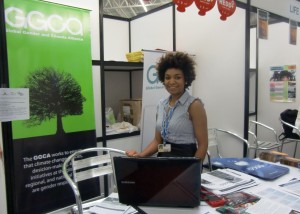Cancun, Mexico– Written by May Akale, WEDO Fellow
 I am here for the second week of COP16 in Cancun. The UNFCCC process that engages government negotiators from all over the world in an attempt to secure a binding deal on climate change, is an amazing process to be a part of.
I am here for the second week of COP16 in Cancun. The UNFCCC process that engages government negotiators from all over the world in an attempt to secure a binding deal on climate change, is an amazing process to be a part of.
I arrived here on Saturday, 4 December and was able to visit the two main sites where this conference is taking place. The first site I got to, the Cancun Messe, is where most parallel and side events are taking place, and the exhibit booths of many civil society and government agencies are located. The second site, the Moon Palace, is an expansive beautiful hotel resort is where the actual negotiations and high-level talks are in progress.
Logistically, getting around is not as efficient as many of us from civil society thought it would be. Cancun may be a small island, but it takes 30 minutes on a designated bus to get from our hotel to the Cancun Messe. From there, it takes another thirty minutes to get to the Moon Palace. However, the atmosphere and activities at this conference quickly eliminated any worry about travel time that I had.
Firstly, I am impressed by the level of commitment shown by all the participants at this conference. Most people have travelled very long distances to be here. There are many civil society organizations, as well as government delegations. Unless one looks at someone’s badge, it is hard to tell whether or not someone is a negotiator, an advocate, or an activist. Everyone rides on the same bus, has conversations with one another, attends the same side events, and stays at the same hotels. In this respect, we all make up a global community interested in seeing some progress made towards collective action on dealing with this most pressing and urgent issue of our time. It seems that we all get the urgency of acting together in moving forward in one way or another. The issues that are involved in resolving this issue are multifaceted and often complex, but that is a discussion for another time.
So far I have attended many side events covering the role of stakeholders in the larger dialogue (civil society organizations and observers are not allowed into negotiating and drafting spaces), the role of UN agencies in moving forward with initiatives, regardless of whether or not a deal is reached by governments, and the importance of considering gender as a crucial component of the fight against climate change. I have also attended a few high-level panels featuring President Calderon of Mexico and UN Secretary General Ban Ki Moon, among other dignitaries, many of them highly respected and prominent women leaders. For me, it has been inspiring to listen to the Executive Secretary of the UNFCCC Christiana Figueres and former President of Ireland, Mary Robinson, speak.
The resounding messages I have heard so far, are that the inclusion of gender equality in discourse and policy crafting and implementation is indispensable. Furthermore, that education and training of all members of society are at the foundation of successfully making the issue of climate change universally understood and addressed at all levels. When I arrived on Saturday, I asked some delegates and members of civil society if they thought a deal would come out of this COP. The consistent answer was no. However, it has been interesting to hear Executive Secretary Figueres and President Calderon, call for a deal and a renewed commitment from member states to result from this conference. Other high-level speakers, including Secretary General Ban Ki Moon, have called for progress on the four key areas of adaptation, mitigation, finance, and technology to be ensured, in case a legal and binding deal is not reached. In a high-level panel, he stated that climate change did not occur overnight, and will not be resolved overnight, but that member states should consider the global implications of not acting soon and urgently, beyond the confines of national interests. In my view which is shared by most here, it is in the best interest of all of humanity for short-term self-interests to be put aside in the attempt to resolve an issue that will in the very near future affect us all, if it has not already. One of the delegates I met yesterday lives on a small island in Papua New Guinea; the inhabitants of her island are preparing to evacuate because of the rising sea levels in that region. I keep imagining how that must feel, and to be at a conference at which states are worried about how much it would cost to take steps that could halt further damage to a planet, we all share.
I keep reminding myself to be realistic and not to expect too much to come out of this conference in terms of a deal in which the commitments are real and will be followed up on by those who make them. Yet, I also want to think that those who are directly involved in these talks will rise above what is status quo, and deliver what the rest of the world wants to hear, and see happen in the form of actions against the further degradation of our collective home. So we’ll see what happens on Friday, and I will be sure to express my thoughts on whatever outcomes we get at the end of this conference.


